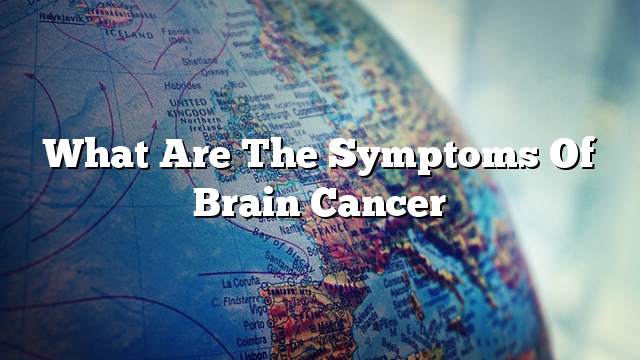brain cancer
Brain cancer is a group of tumors that originate from brain cells, due to abnormal or regular proliferation of cells within it. Tumors may originate from nerve cells, from the surrounding membrane (meninges) or from nerves within the brain (cranial nerves) Tumors of the brain may be benign or cancerous, brain tumors lead to symptoms such as headache pain, blurred vision and other symptoms, and may lead to complications such as loss of consciousness, strokes and others, and it is important to diagnose brain tumors because some species can be treated and cured sometimes, Brain tumors, including metastasis Surgery, radiotherapy and chemotherapy, and treatment options vary according to the type and stage of the tumor.
Brain cancer is divided into two main types: primary brain cancer, secondary brain cancer, or prolapse. The first is caused by the growth of brain cells, including brain membranes and blood vessels, and formation of cancerous tumors. Secondary is caused by the growth of a tumor in another organ and the arrival of cancer cells of the brain through the duct the blood.
Malignant tumors develop and spread aggressively and aggressively and control healthy cells by taking their place and supplying blood and nutrients.
The benign tumors are neither aggressive nor aggressive. The difference between benign tumors and malignant tumors is that benign tumors do not spread to other organs of the body, nor do they invade the brain cells or grow rapidly. The rapid growth of malignant tumors causes rapid damage to brain cells.
Although benign tumors are less dangerous and more severe than malignant tumors, they cause some brain problems, but these problems slowly worsen compared to malignant tumors, but in general the tumor is benign or malignant causing a problem in the brain, the brain is a closed area, Increased intracranial cells cause intracranial pressure or distortion of the surrounding vital structures, affecting their ability to function.
Symptoms of brain cancer
People with brain cancer have many symptoms and signs, and may not be exposed to any of them. These symptoms may result from diseases other than brain cancer.
The symptoms of brain cancer can be divided into general symptoms and specific symptoms, and general symptoms are produced by the pressure generated by the tumor on the brain or spinal cord. Specific symptoms are caused by the disruption of the functioning of a specific part of the brain due to the tumor. For many people with brain cancer, they are diagnosed after complaints with the doctor, such as head pain or other changes.
General symptoms of brain cancer
Common symptoms include:
- headache : Which can be severe, and may get worse when doing any work or in the morning.
- Seizures : The so-called convulsions; which is the movements of sudden involuntary muscles of the patient. The patient may experience several types of convulsions, and can be controlled by taking certain types of medicines, and the various types of seizures will be as follows:
- Epileptic seizures: where one or more muscles are jolted, vibrated or stretched.
- Trampatic tension: where loss of consciousness and tension of the body followed by convulsions and relaxation of the muscles, and also lose the functions of the body different. It may be accompanied by a period in which the same patient breaks for 30 seconds so that his color is blue.
- Sensory seizures: There is a change in sensation, hearing, sight and smell without loss of consciousness.
- Complex partial seizures: There may be a lack of awareness or loss of consciousness, whether full or partial. And come accompanied by frequent movements involuntary trembling.
- Change in memory or personal level .
- Nausea and vomiting .
- General fatigue and exhaustion .
Specific symptoms of brain cancer
Specific symptoms according to the affected part of the brain are:
- The sensation of pain or pressure place or around the tumor.
- Loss of balance and difficulty in fine motor skills is associated with a tumor in the cerebellum.
- A change in decisions and judgments, including loss of initiative in dealing, as well as laziness and muscle weakness or paralysis, all this may be associated with the presence of a tumor in the frontal lobe of the brain.
- Full or partial vision loss may indicate a tumor in the occipital or temporal lobe of the brain.
- Changes in hearing, speech, memory or emotional state as aggression, as well as problems in understanding and retrieving words, may be associated with tumors in the frontal or temporal lobe of the brain.
- A change in the sensation of touch or pressure, weakness of the hand or foot on one side of the body, or confusion of the patient between the right or left side may result in a tumor in the frontal or parietal lobe of the brain.
- The inability to look up may be caused by a tumor in the pineal gland.
- Milk production and menstrual cycle disorder in women, as well as increased growth of the hands or feet in adults may be associated with pituitary tumor.
- Difficulty swallowing, weakness of the facial muscles, numbness and double vision are all symptoms associated with the tumor in the brain stem.
